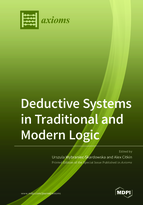Deductive Systems in Traditional and Modern Logic
A special issue of Axioms (ISSN 2075-1680). This special issue belongs to the section "Logic".
Deadline for manuscript submissions: closed (15 August 2019) | Viewed by 52728
Special Issue Editors
Interests: logic and its applications; metalogic; history of logic; philosophy; mathematics; information sciences; theory of deductive systems and foundations of mathematics
Special Issues, Collections and Topics in MDPI journals
Interests: intermediate logics; varieties and quasivarieties of Heyting algebras
Special Issues, Collections and Topics in MDPI journals
Special Issue Information
Dear Colleagues,
I have the intention of launching a Special Issue of Axioms devoted to (1) the presentation of some new deductive systems, modified known systems and little-known systems with their specifics, intuitive foundation, and methodological or metamathematical properties (2) comparison of systems of the same scientific discipline with each other; as well as (3) a collective review of current and updated systems of the same type, taking into account discussed below all aspects and explaining their functioning in the past, present, and future (deductive systems will be understood as deductive theories and distinguished from their syntactic characterization by appropriate ordered pairs or triples).
Contemporary understanding of science, as a science of a high degree of exactness, requires treating it as a deductive theory (a deductive system). Loosely speaking, such a theory (system) is a set of its language sentential expressions that includes the set of all its expressions which are derivable (are deducible) from some expressions of the set by means of deduction (inference) rules, i.e. which are its consequences and have a proof on the basis of the expressions of the set. The feature of deductive systems (theories) is the deducibility and provability of their theorems. These systems are built using a method of deduction employing (a) the axiomatic method or (b) the natural deduction method (Jaśkowski-Słupecki-Borkowski, Gentzen or semantic tables). Method (b) leads to natural deduction systems, and the most often used method—(a)—leads to axiomatic systems and to the presentation or characterization of logical and mathematical theories as axiomatic deductive systems. Methods (a) and (b) may be used to build some other scientific disciplines such as physics, chemistry, sociology, philosophical and psychological sciences, information sciences, discursive sciences, computer science and some technical sciences.
Deductive sciences have not always been and are not always immediately built as axiomatic systems. Depending on the degree of methodological precision, three of their forms are distinguished: pre-axiomatic, non-formalized axiomatic, and formalized axiomatic. As we know, the pre-axiomatic form was typical of arithmetic and geometry, and later set theory, and probability theory and its axiomatization was carried out only in the 19th century, while such mathematical theories as the Boolean system and theories of groups, rings, fields were immediately built as formalized axiomatic ones. Logical systems (calculi) and theories based on them and constructed by means of a deduction method are most often formalized axiomatic systems, but they can also be considered as formalized natural deduction systems.
Formalized axiomatic systems have a tradition originating from G. Frege (1891, 1903), but the first axiomatic system (non-formalized) in the history of science—as it was disclosed by Jan Łukasiewicz in his famous monograph on Aristotle’s syllogistic (1951)—was Aristotle’s syllogistic. J. Łukasiewicz initiated the construction of the first systems of syllogistic corresponding to the contemporary requirements, and thus the formalized axiomatic systems. He conducted formalization of syllogistic on two levels, using, for the first time, in addition to the usual axiomatic method by means of proof, a new axiomatic method by rejection proof—the so-called axiomatic rejection (or refutation) method. He, and continuators of his ideas (mainly J. Słupecki and the co-workers from his research circle), applied this method to the bi-level formalization of some classical and non-classical logical deductive systems of sentences or names to define two disjoint sets of language expressions of the given system: the set of all its theses (theorems); asserted, accepted, intuitively true expressions (called the assertion system); and the set of all the other non-accepted, or intuitively false, rejected expressions of the system (called the rejection or the refutation system). In this way, the bi-aspectul formalization of deductive systems provides some new inspiration to build different sciences.
Prof. Dr. Urszula Wybraniec-Skardowska
Dr. Alex Citkin
Guest Editors
Manuscript Submission Information
Manuscripts should be submitted online at www.mdpi.com by registering and logging in to this website. Once you are registered, click here to go to the submission form. Manuscripts can be submitted until the deadline. All submissions that pass pre-check are peer-reviewed. Accepted papers will be published continuously in the journal (as soon as accepted) and will be listed together on the special issue website. Research articles, review articles as well as short communications are invited. For planned papers, a title and short abstract (about 100 words) can be sent to the Editorial Office for announcement on this website.
Submitted manuscripts should not have been published previously, nor be under consideration for publication elsewhere (except conference proceedings papers). All manuscripts are thoroughly refereed through a single-blind peer-review process. A guide for authors and other relevant information for submission of manuscripts is available on the Instructions for Authors page. Axioms is an international peer-reviewed open access monthly journal published by MDPI.
Please visit the Instructions for Authors page before submitting a manuscript. The Article Processing Charge (APC) for publication in this open access journal is 2400 CHF (Swiss Francs). Submitted papers should be well formatted and use good English. Authors may use MDPI's English editing service prior to publication or during author revisions.
Keywords
- Metalogic and metamathematics
- Syntax
- Well-formed expression
- Deduction and natural deduction
- Deductive sciences
- Axiomatization
- Formalisation
- System of axioms
- Inference rule
- Proof and methods of proof
- Consequence operation
- Deductive system (theory)
- Assertion system
- Refutation (rejection) system
- Classical and non-clasical logical and mathematical systems
- Deductive systems of different sciences
- Methodology of deductive systems





